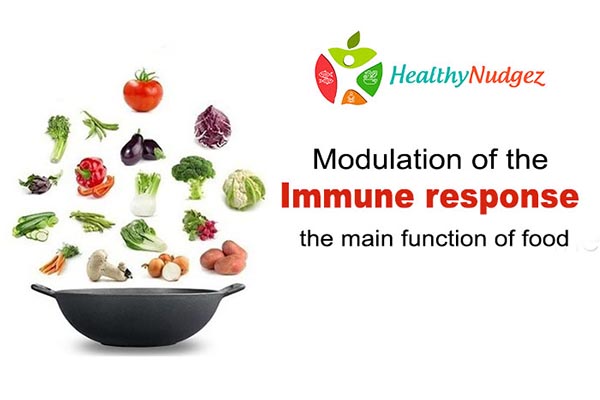Modulation of the Immune response – the main function of food
Modulation of Immune response is one of the most important function of the foods that we consume. Immune system guards the body against invading pathogens and other foreign matter, thus protecting the body against disease and maintaining health. It can, therefore, be said that the Immune system is the human body’s self defence system. The deterioration in the immune system causes loss of health and increased risk of infection.
Factors that affect the optimal functioning of the immune system are, malnutrition, aging, physical and mental stress or undesirable lifestyle. Ingestion of foods that have an immune modulating function is an effective way of preventing the immune system from declining and thus reducing the risk of infections and chronic diseases.
The nutrients which support and stimulate the immune system are called the immuno-nutritional elements or functional nutrients. The nutrients and their role in stimulating the immune system are;
- Proteins: Ingestion of adequate quantity of good quality protein is very important for the proper functioning of the immune system. Proteins are the basic frame work of the human body and therefore, form the basic framework of the body’s defence system also. Adequate proteins in diet speed up wound healing, stimulate hormonal activity which supports immune system and improve cell replication. Deficiency of essential amino acids can supress the immune response of the bod y. It is important therefore, to include milk and milk products, eggs, meat, fish, legumes and nuts, etc, in daily diet. These foods have biologically valuable proteins which keep the immune system strong.
- Vitamins and antioxidants are the other group of nutrients that exhibit the important immune-modulating function. Vitamin A, C and E rich foods must be consumed daily as these form the body’s first line of defence. These vitamins act as free radical scavengers. Free radicals are produced in the body as the by-product of all activities that happen inside the cell. Excessive production of these free radical cause damage to the cells and many diseases, so, need to be thrown out of the body. Also, vitamin deficiency causes repression in the production of immune cells and also malfunction of these cells. Fresh fruits and vegetables, especially the red-green ones, citrus fruits, egg yolk, milk fat, fatty fish are rich sources if these vitamins.
- Minerals prevent the oxidation of the lipids in the cell membrane, thereby reducing the oxidative stress affecting the immune cells. Minerals generally collaborate with vitamins and provide vitamin transportation to the areas where they are much needed. Calcium, Iron, potassium, zinc, copper and selenium are the minerals of importance for the immune system. Calcium is found mainly in milk and its products. Iron rich foods are mainly from the animal kingdom such as meat, chicken and eggs. Sprouts and legumes are the vegetarian sources of iron. Best sources of zinc are liver, eggs, cheese, walnut and whole wheat. Potassium is found is all foods that are consumed fresh such as salads and fruits, tender coconut water, citrus fruits, fresh soups and juices. Cashews, sunflower seeds, raisins and lentils are good sources of copper and selenium is found in meat, fish, cottage cheese, milk, beans, oats and banana.
- Pre- and pro-biotics are foods, that have an added amount of immune friendly bacteria or they are capable of helping these bacteria grow in the gut. Intestines are the largest immune organ of the body. The bacteria from outside which enter the body along with the ingested food interact with the bacteria present in the intestines. If the bacteria present in the intestines are friendly and immunity promoting, then the integrity of the intestinal wall will be maintained and the pathogens will not be able to invade the system. These friendly bacteria act as antibiotics and kill the pathogenic bacteria. Yogurt, curd, kefir, and most fermented foods are all probiotics. Prebiotics are the foods that help promote the friendly bacteria and are mostly the high fibre foods such as oats, whole grains and raw banana.
Consequently, in order to strengthen the immune system, reduce the risks of diseases and stay healthy, we need to strengthen our natural defence system. Adequate and balanced nutrition can help us achieve this goal. A healthy immune system not only makes us feel well but also helps us to utilize our energies well.
Know More – Nutritionist in Delhi

